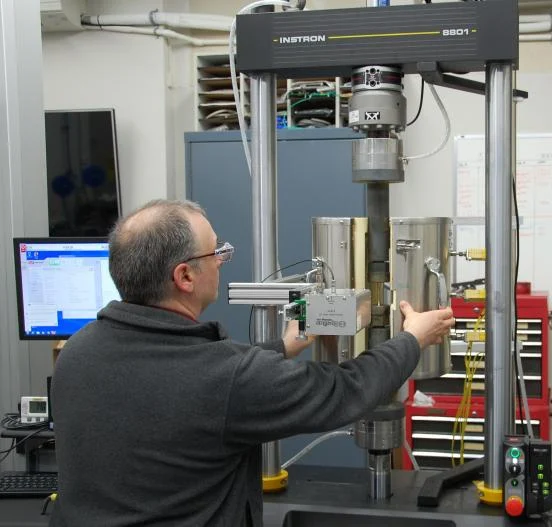High Temperature Fatigue Testing Services
HIGH-TEMPERATURE FATIGUE TESTING REPLICATES OPERATING CONDITIONS
In response to increased demand for high-temperature fatigue testing from the aerospace, automotive and power generation industries, IMR Test Labs-Ithaca has invested in several dedicated High-Temperature Fatigue testing units. Our lab is compliant with Nadcap testing standards, and we follow the ISO 12016 and ASTM E606 standard practice specs for strain controlled fatigue testing, used for simulating mechanical loading into the plastic region.
The test frame's ability to expose the test specimen to temperatures up to 1800°F can replicate the service conditions experienced by turbine blades in gas engines, power generating plants and jet engines.
HIGH-TEMPERATURE FATIGUE TESTING CAPABILITIES
- High capacity loading frame maximizes lateral and axial stiffness during reverse stress testing.
- All-electric actuator delivers precise slow speed control with virtually silent operation and no hydraulic infrastructure requirements.
- AlignPRO alignment fixture and supporting software are provided as standard to ensure precision loadstring alignment.
- Three zone furnace with cascade control of specimen temperature with optimized temperature gradient.
- Dedicated LCF3 software suite provides streamlined test setup and analysis of hysteresis loops, plastic strain measurement and common LCF calculations.
- The Instron LCF system are fully integrated and are supplied ready to test, meeting all appropriate international standards.
Click here to request a quote, or click on the button below for more information on IMR's high-temperature fatigue testing capabilities.

MATERIAL TRANSFORMATIONS REVEALED BY HIGH-TEMPERATURE FATIGUE TESTING
Changes to both microstructure and performance can significantly alter material properties, and understanding how this occurs when materials are exposed to elevated temperatures is crucial for many industries.
To learn about the four material transformations revealed by high-temperature fatigue testing read our blog.
Adhesion (Peel) Testing
Bend Testing
Bond Strength Testing
Charpy Impact Testing (-320°F to 450°F)
Climbing Drum Adhesion of Sandwich Composites
Coating Adhesion
Coating Shear Fatigue
Coefficient of Thermal Expansion by TMA
Composite Testing (Fiber Reinforced)
Compression Set
Compressive Properties
Core Shear Properties of Sandwich Construction by Beam Flexure
Creep and Stress Rupture Testing
DMA (Dynamic Mechanical Analyzer)
Ductility
Elastic Modulus
Fatigue Testing
Filled Hole Tension & Compression
Flattening
Flat-wise Tensile Testing
Flexural Properties
Floating Roller Peel Strength
Fracture Mechanics
Gel Time
Hardness (Rockwell, Brinell, Durometer, Shore, Barcol, Knoop, Vickers, Macro Vickers)
Heat Aging
Heat Deflection by TMA
Heat Treatment (furnace to 2100°F)
Hydrogen Embrittlement
Hydrostatic Pressure
Indentation Toughness
Interlaminar Shear
Jominy Hardenability
Lap Shear Testing
Machining & Specimen Preparation
Materialography
Modulus of Rupture (MOR)
n-Value (Strain Hardening Exponent)
Open Hole Tension and Compression
Pipeline Integrity Testing
r-Value (Plastic Strain Ratio)
Residual Strength of Composites After Impact
Rotating Beam Fatigue
Shear Testing of Rivets to ASTM B565, Single/Double
Short Beam Strength
Shot Peen Qualification
Single-Edged Notched beams (SENB)
Slow Strain Rate (G129)
Specimen Conditioning
Strain Gaging
Surface Roughness (ANSI/ASME B46.1)
T Peel Strength
Tear Resistance of Films & Sheeting
Tear - Rubbers & Elastomers
Tensile Testing
Torsional and Axial Fatigue (200 lb)
Tube Testing (Tensile, Flare, Hydrostatic)
Welder & Procedure Qualification
Wire/Spring Testing (Wrap, Coil, Bend)
Young's, Tangent and Chord Modulus (Room Temperature)
RELEVANT ACCREDITATIONS
Click here for a complete list of accreditations and certifications for all IMR Test Labs locations.


